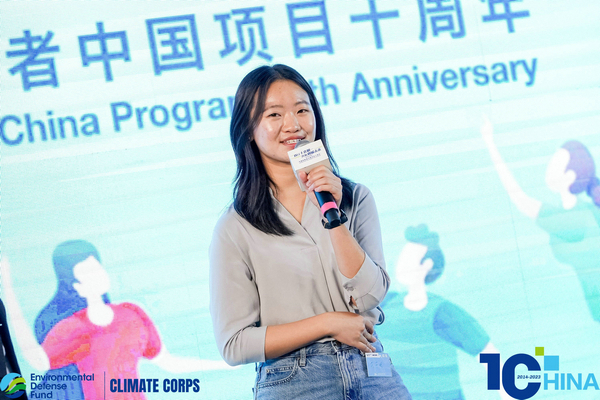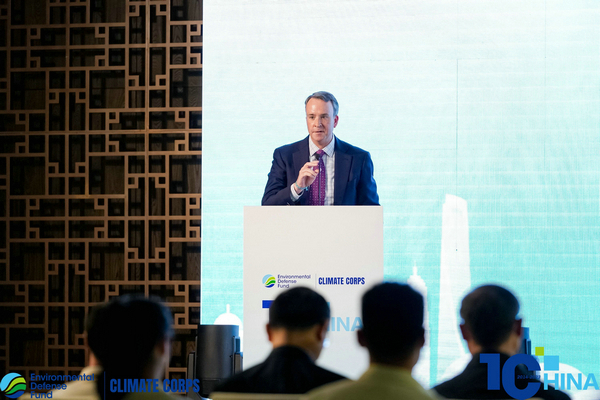Nurturing climate leaders for low-carbon future


Soo Yu Han, from Malaysia, is a third-year graduate student specializing in global environmental leadership at Tsinghua University. This past summer holiday saw her work as a fellow of the Climate Corps China program, hosted by the Environmental Defense Fund, an international nonprofit environmental advocacy group founded in 1967.
EDF paired Su with LONGi Green Energy Technology Co Ltd, a leading photovoltaic module supplier in China, where she completed a 10-week internship with the sustainability development team of the company’s brand management department. The placement led the Malaysian student to gain hands-on experience in the PV industry, find her position in the environmental cause, and inspire her to bring her knowledge and experience back to her home country one day.
“Before we started the internship, EDF provided us a three-day intensive training, which involved lectures by industry experts and former fellows, company field trips, and mock carbon markets. It was informative and interactive and helped us fellow interns get to know each other,” Soo said.
During the internship, Soo analyzed the carbon footprint of the products manufactured by LONGi’s main competitors. “This helped LONGi better understand its performance and competitiveness in the industry,” Soo said.
The environmental engineering student was also tasked to pinpoint the company’s challenges in reducing its PV modules’ carbon footprint to meet the importing countries’ requirements.
Soo found that the upstream supply chain was the most significant contributor to the carbon footprint of the PV modules. To address the issue, she proposed a preliminary framework, including empowering suppliers to enhance their carbon reduction awareness and skills, adding requirements regarding carbon reduction to LONGi’s supplier code of conduct, and providing carbon reduction support to critical suppliers to ensure the goals are met.
The intern’s proposal, boasting high application potential, won the approval of LONGi’s sustainability development team, which is considering incorporating it into the company’s existing supply chain emissions reduction scheme to reduce the carbon footprint of its products, as well as improve its environmental, social and governance performance.
“That LONGi’s considered my proposal is a huge recognition of my work as an intern, and I am very looking forward to seeing it implemented,” Soo said.
Planning to build a career in sustainability, Soo also appreciated the experience shared by colleagues and other fellows and the connections she formed during the program, as she will join the job market soon.
Soo is one of the nearly 200 graduate students from top Chinese universities who have participated in the Climate Corps program, and LONGi is one of over 40 multinational and domestic companies — including Danone, Lenovo, McDonald’s, and Walmart that have hosted the program fellows since it was introduced to China in 2014.

The Climate Corps China program celebrated its 10th anniversary in Shanghai on September 22, which also marks the third anniversary after China proposed its dual carbon goals — peaking carbon dioxide emissions by 2030 and achieving carbon neutrality before 2060.
“The Climate Corps China program supports these overarching goals. To date, our fellows have helped their host companies in China identify over $130 million in cost-saving opportunities, equivalent to about half a million metric tons of greenhouse gas emission reductions,” said Tom Murray, executive vice-president of EDF Solutions, at the event.
“Moreover, as these fellows continue to ascend in their careers, their impact will continue, helping to lead the way toward a thriving, carbon-neutral future by 2060,” he added.
To meet the ambitious “dual carbon” targets, China put in place a “1+N” policy framework, including a document issued in 2022 by the Ministry of Education urging colleges and universities to cultivate talents urgently needed for carbon neutrality and improve the training quality of students specializing in “dual carbon”-related majors.
It is reported that during the country’s 14th Five-Year Plan period (2021-25), between 555,000 and a million “dual carbon” professionals are in demand.
Climate Corps has been responding to this demand with the vision to “accelerate the transition to a low-carbon future by empowering, connecting, and supporting the leaders of today and tomorrow,” said Murray.
Launched in the US in 2008, Climate Corps is “rooted in a firm conviction: the private sector, with its substantial potential for leadership and innovation, must play a major role in reducing greenhouse gases and unlocking a sustainable future,” said Murray, the program co-founder.
The executive, a longtime corporate sustainability advocate who spearheaded the EDF + Business program for years, said that in figuring out the barriers to progress on climate and clean energy, he and his team found that many companies, even the big global ones that the organization worked with, lacked in the expertise to help them do business sustainably.
“We took that need and married it with the fact that everywhere I go in my travels and work around the world, young people are passionate about making the world a better place, and they look for jobs in that space. This program is helping solve the two needs,” said Murray.




































